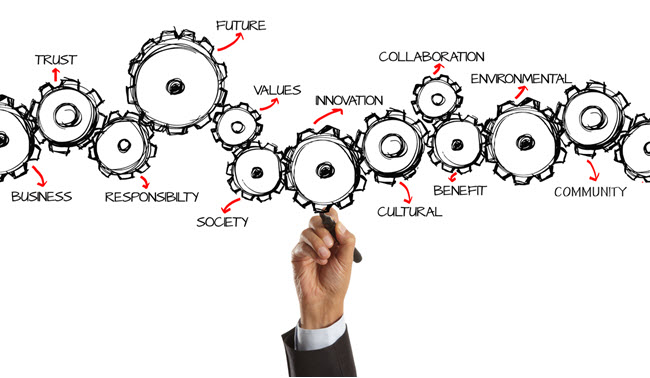Think of giving not as a duty but as a privilege. - John D. Rockefeller Jr.

Being recognized for Corporate Philanthropy has long been thought of as a nice PR benefit of business giving. However, “giving” just isn’t enough. Even being a good corporate citizen can be improved upon. Being a socially responsible business should be the goal of every company's giving program.
Corporate Social Responsibility makes good business sense.
Three Different Types of Business Giving
In 2017 corporations and foundations gave a record $87.67 billion to charitable organizations. While it is a long and noble tradition for businesses to give back to their communities, not all types of corporate giving are the same. There are three main ways to give as a business, and they are not interchangeable.
- Corporate Philanthropy. This can best be summed up as giving money away to one or more charitable causes.
- Corporate Citizenship. This type of business giving combines philanthropy with a broader sense of community commitment. For instance, you might see a business more involved in local giving or providing days of service.
- Corporate Social Responsibility. This involves both philanthropy and citizenship PLUS a set of focused, proactive initiatives that cross a business's financial and operational boundaries.
What Corporate Social Responsibility Means at CFO Selections
Just five years after launching CFO Selections, we established a foundation to begin giving back to the community. With more than simply a goal of corporate philanthropy or citizenship, the CFOS Foundation has now been operating for over a decade with the mission of “providing time, talent, and treasure to foster children within the communities CFO Selections serves.”
At CFO Selections, we approach corporate social responsibility by:
- Proactively and intentionally focusing on a particular cause
- Facilitating actions through our foundation
- Going beyond donating just money (our treasure), to include pro bono services (our time and talent)
- Encouraging team members to give and by supporting their individual philanthropic efforts
Some of the specific organizations that the CFOS Foundation works with and touches include:
- Bridge Meadows, builds permanent housing for foster youth and adoptive parents
- Team Child, advocates in the court system for challenged youth
- Kindering, provides assistance to families with children of diverse abilities
At CFO Selections, we are honored and humbled by the recognition we’ve received for our philanthropic efforts. CFO Selections is a recurring winner (2009-2018) of the Corporate Citizenship Award given by the Puget Sound Business Journal, honoring outstanding corporate philanthropy by Washington businesses. The company has also received the Community Impact Award (2015, 2017, & 2018) from Seattle Business Magazine, honoring Washington state organizations and businesses that make a measurable and tangible impact on their communities.
In December 2017, CFO Selections was one of just five companies in Washington state given the Medallion Award by the National Association of Secretaries of State, which recognizes organizations or businesses that have a commitment to giving back to their communities.
Community recognition has created opportunities for us in recruiting, partnerships, and growth. More importantly it gives us a platform to spread the message of one of our guiding principles:
Businesses have a responsibility to give back to the communities from which they earn their living.”
Why Corporate Social Responsibility Makes Good Business Sense For Your Business
Some businesses find it hard to justify any type of corporate giving, but this approach is wrong. If you are avoiding philanthropy completely or going through the motions with the wrong motives, it’s time for you to get a fresh perspective.
When done right, corporate social responsibility is a win-win for the business and its community. Being generous with business resources (money, time, & talent) places a company in a better position to attract strategic partners, employees, and customers. It makes good business sense to create a program of focused, intentional giving.
What Impact Does Corporate Social Responsibility Make?
The impact of being socially responsible as a business is far-reaching. For business owners, investing corporate time and other resources in corporate social responsibility programs is an excellent way to engender goodwill, connect with the community, and build a better neighborhood in which to do business.
For the Business and its Shareholders.
Many businesses believe that they are "changing the world" with their products and services, and this may be true, but, corporate social responsibility takes this a step further and gives the company another way to leverage the effect that it has on the greater community.
For Team Members.
Sure, an employee can choose to participate in the "Ice Bucket Challenge" or a charity walk on their own, but more would prefer that their employer take the lead. This is particularly the case with Millennials, where more are using this factor as a deal-breaker when considering employment.
One study revealed that 64% of Millennials would decline a job if a company is not socially responsible and 75% will even take less pay to work for one of these giving companies. According to a survey commissioned by Deloitte, 93% of those surveyed believed that community service enhances leadership skills.
Being socially responsible provides something more than a paycheck to employees. It creates an environment that generates additional levels of passion and commitment to the company, which carries over into serving clients.
For Customers.
Not only do customers want the companies they use today be socially responsible, many expect it. A recent study revealed that 87% of consumers would choose a company because it advocated for a cause important to them.
Theo’s Chocolates has created partnerships with 5,500 cocoa farmers around the world, and each purchase of its products allows these partners to support their families and communities.
Reputation matters in today's business world. When you do good acts, people will notice even if you don't spend a fortune on ad campaigns to toot your own horn.
For Vendors and Referral Partners.
Your company will become a preferred partner for your vendors and referral partners because of the “glow” they’ll get through their association with you.
A good example is REI. The global outdoors giant has made it clear that it puts "purpose before profits," meaning it does everything with the environment and sustainability in mind. The company releases an annual report on its efforts, the latest of which reveals that it is giving back close to 70% of its profits to the outdoor community. As a vendor, choosing to work with REI over a profit-driven competitor would be an easy choice.
One note - This constituency can also turn away from your company if you don’t reinvest in your community.
For Government Entities.
Public funding is often limited for vital programs, so the jobs of government entities become easier with the help of good corporate partners. The opposite can also be true. A good example of this is the "corporate head tax" the City of Seattle tried to impose on large employers (i.e. Amazon) because they felt a distinct lack of partnership within the community.
For Non-Profits.
The non-profit organizations and the communities they serve will benefit from your contributions of time, talent, and treasure.
Best Practices to Create or Improve Your Corporate Social Responsibility Program
Most companies have something more that they can offer to the world beyond their products or services. It could be their influence with partners that can help get things done, the expertise of employees, or access to financial resources to assist a charity or other organization in need.
Leading employers and organizations are taking corporate social responsibility to a new level. Whether you already have some programs in place and want to improve them or are starting from scratch, here are some best practices to create a winning program that will have the greatest impact across the various constituencies we listed.
- Involve Your Staff. Get your employees involved, whether you are at the beginning stages of designing a program or need to make some tweaks to your current one.
- Avoid Controversy. There may be some causes that are near and dear to you, or some of your employees, that are simply too polarizing. Anything political in today’s climate should be off limits, but most people can get behind helping the less fortunate or being environmentally-friendly.
- Formalize Your Programs. Any program you create should include budgeting, plans for fundraising, and the donation of staff time or other company resources. To make sure that corporate social responsibility is woven into the fabric of your business, schedule some lunch n' learns so that employees can get educated on your program and spread the word.
For additional inspiration another excellent example of a company that has woven social responsibility into the fabric of their organization is Seattle-based GlassyBaby. Founded by three-time cancer survivor Lee Rhodes, the company's mission is to help alleviate the financial struggles that people face when fighting this disease. To date, it has donated over $9 million to various organizations that offer healing and hope.
Corporate social responsibility has become increasingly important over the past several years for its ability to engage customers, attract top talent and partners, and improve a company's reputation. Above all else, it's the right thing to do.
My Challenge To You -
If your company is in the early stages of developing or implementing your corporate social responsibility program, it is always a great time to focus on these efforts and gain the benefits. Start now.
If you have a program in place that your team doesn’t fully embrace, dial it up a few notches. Enhancing your programs makes good business sense. Keep going.
For those of you out there that have successful corporate social responsibility programs in place. Teach other businesses to do what you do. Create more socially responsible businesses. Continue to live up to your responsibility and give back to the communities where you earn your living. Take the next step.
It just makes good business sense.
About the Author
 Tom Varga is a Founder and the Managing Partner of the Valtas Group. Valtas is Tom’s fourth entrepreneurial effort having founded several successful professional services firms previously including CFO Selections LLC and Accounting Solutions Partners in the past 20 years.
Tom Varga is a Founder and the Managing Partner of the Valtas Group. Valtas is Tom’s fourth entrepreneurial effort having founded several successful professional services firms previously including CFO Selections LLC and Accounting Solutions Partners in the past 20 years.
Tom Varga and his Partners Mark Tranter and Rich Leo also started the CFOS Foundation to fulfill a deep and passionate commitment to philanthropy and the pivotal role corporate philanthropy must play in the community.





